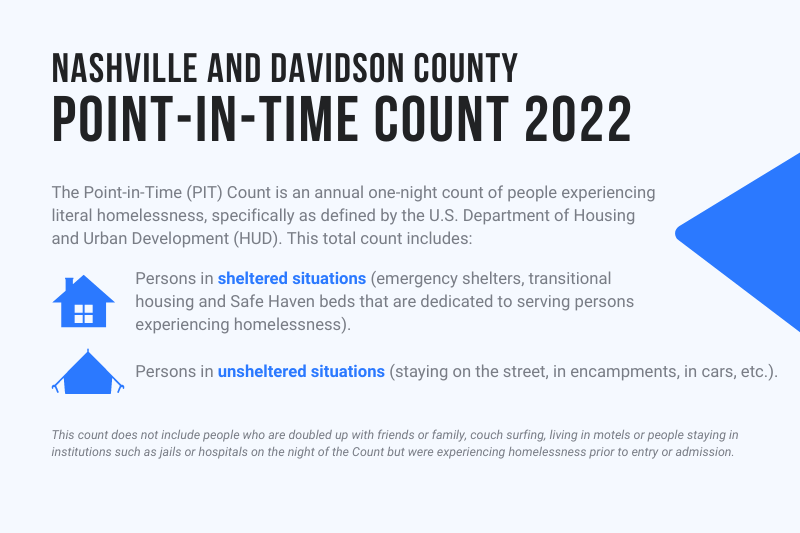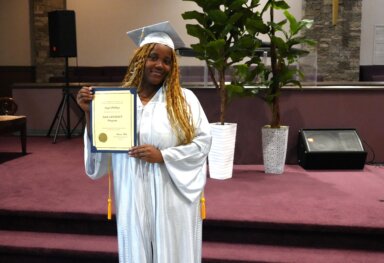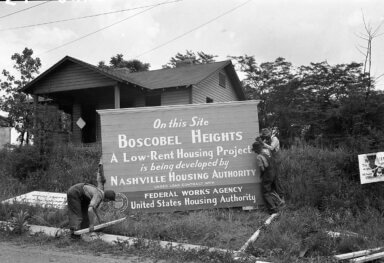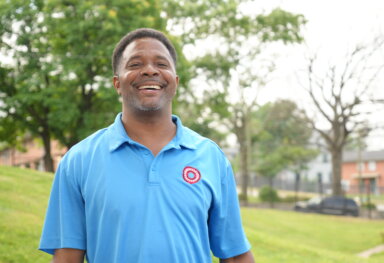The Metropolitan Development and Housing Agency (MDHA) has released the results from Nashville’s 2022 Point-in-Time (PIT) Count, a one-night count of sheltered and unsheltered persons experiencing homelessness. The total number of persons experiencing literal homelessness counted on the night of the Count was 1,916, a 5% decrease from 2020. Click here for a breakdown of the statistics. Due to COVID-19, there was no unsheltered PIT Count in Nashville in 2021.
The temperature dropped to around 34 degrees during the Count, which was held on the evening of Jan. 27 and the early morning hours of Jan. 28. More than 100 volunteers from 27 agencies and universities took part in this year’s Count. Room In The Inn and Nashville Rescue Mission operated their shelter programs and counted people staying with them during that night. No Metro overflow shelters were opened on the night of the Count, and Nashville’s cold weather plan was not activated.
The U.S. Department of Housing and Urban Development (HUD) requires Continuum of Care (CoC) organizations across the country to conduct a Count each year during the last 10 days of January. As the CoC Collaborative Applicant in Nashville, MDHA conducts the Count in collaboration with the Metropolitan Homeless Impact Division (MHID), Tennessee Valley Healthcare System, Mental Health Cooperative and other partners.
“The PIT Count is essential to our work in accurately supporting our unhoused neighbors,” said MHID Interim Director Jay Servais. “It gives us a fresh look at needs, new trends and the latest trajectory of the community. We’re then able to more accurately address their needs, getting them closer to stable living and improved quality of life.”
“The Count requires months of planning, and I am grateful to MDHA staff, the partners and the many volunteers who continue to make this process go smoothly each year,” said MDHA Executive Director Dr. Troy D. White.
Additional key findings from the 2022 Count include:
- 71% of the adult population experiencing homelessness on the night of the Count were men;
- 42% of the adult population experiencing homelessness on the night of the Count were Black or African American;
- 82% of unsheltered individuals said that lack of income was their primary barrier to finding housing;
- 52% of unsheltered people surveyed are experiencing chronic homelessness;
- 39% of unsheltered individuals reported problems with substance abuse;
- 48% of unsheltered individuals reported mental health problems;
- 12% of unsheltered individuals reported being survivors of interpersonal violence.
The Count is important in establishing some dimension of homelessness and is one of a variety of sources of data needed to tell the whole story of homelessness, but the method is not without limitations. The numbers represent a point-in-time snapshot and do not reflect the true extent of homelessness over an entire year.
The top three sections in the below graphic illustrate the populations that are included in the Count. The unsheltered includes persons experiencing homelessness that were seen by volunteer teams the evening of Jan. 27 and early morning hours of Jan. 28, 2022.
Literally homeless includes beds dedicated for persons experiencing homelessness at emergency shelters programs such as the Nashville Rescue Mission, Room In The Inn, Centerstone, Launch Pad, Metro Social Services, Morning Star Sanctuary, Oasis Center for Youth, Operation Stand Down Tennessee (OSDTN), Safe Haven Family Shelter, Welcome Home Ministries and YWCA of Nashville.
HUD’s Definition of Homelessness includes people sleeping in transitional housing beds dedicated to persons experiencing homelessness, including select programs at Matthew 25, the Nashville Rescue Mission, OSDTN, Room In The Inn, The Mary Parrish Center and The Salvation Army.
The Count does not include those who meet the broadest definition of homelessness, including individuals and families defined as homeless under federal statutes other than HUD. For example, the U.S. Department of Education employs a broader definition of homelessness that includes children in families who are doubled up or living in area motels without a voucher due to economic hardship or housing loss.
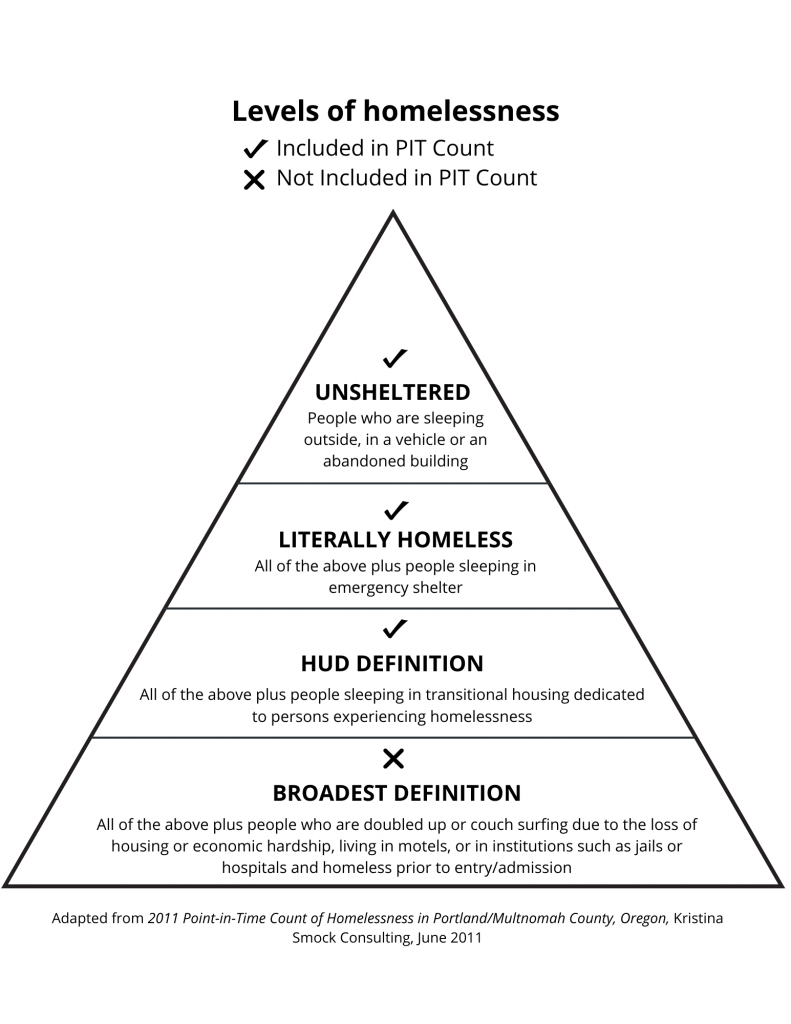
Here’s How You Can Help:
Volunteer with a community partner who serves people experiencing homelessness. To find information about homeless services providers, visit www.wttin.org.
Donate items such as water, sunscreens, new underwear, socks and non-perishable food items to help people experiencing homelessness. Contact the Metro outreach team by emailing keith.alexander@nashville.gov to find out where to drop off donations.
Consider a financial contribution. How’s Nashville assists people with up to $1,000 in move-in costs per household, and there is an urgent need to replenish the community’s fund. Donations are tax-deductible. For more information, email april.calvin@nashville.gov.
To learn more about the work of the Metro Homeless Impact Division, visit: http://MHIDNashville.weebly.com or https://www.nashville.gov/departments/social-services/homeless-impact-division.
MDHA needs landlords willing to accept Section 8 Housing Choice Vouchers. This program provides low-income individuals and families an opportunity to find affordable housing in the private market. Currently, 717 landlords accept the more than 7,000 vouchers administered by MDHA. If you are a landlord and would like more information about the program, please email section8@nashville-mdha.org.
The Low Barrier Housing Collective is a collaboration among support service providers, landlords and community members in Nashville dedicated to ending homelessness. Based at the Metro Homeless Impact Division, the Collective connects individuals and families experiencing homelessness to private market units that offer flexible screening criteria in exchange for benefits designed to stimulate landlord participation and mitigate risk for the property owner. For more information, visit https://www.lowbarrierhousingcollective.org/.
Join a listserv of nearly 700 interested agencies and individuals who want to end homelessness or attend a meeting of the Nashville Coalition for the Homeless and the CoC. For more information, email stolmie@nashville-mdha.org.
